Filter by
The language used throughout the course, in both instruction and assessments.
1,455 results for "python"

Google
Skills you'll gain: Data Analysis, R Programming, SQL, Spreadsheet Software, Business Analysis, Business Communication, Data Visualization, Data Management, General Statistics, Big Data, Communication, Computer Programming, Data Science, Data Visualization Software, Databases, Exploratory Data Analysis, Extract, Transform, Load, Leadership and Management, Microsoft Excel, Problem Solving, Small Data, Statistical Programming, Tableau Software
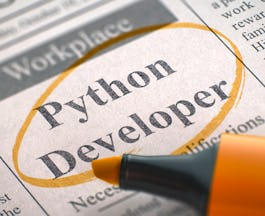
Rice University
Skills you'll gain: Computational Logic, Computer Programming, Critical Thinking, Mathematical Theory & Analysis, Mathematics, Programming Principles, Python Programming, Algorithms, Applied Mathematics, Data Analysis
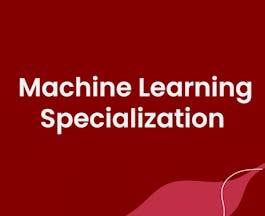
Multiple educators
Skills you'll gain: Machine Learning, Machine Learning Algorithms, Applied Machine Learning, Algorithms, Deep Learning, Machine Learning Software, Artificial Neural Networks, Human Learning, Statistical Machine Learning, Python Programming, Regression, Mathematics, Tensorflow, Critical Thinking, Network Model, Reinforcement Learning
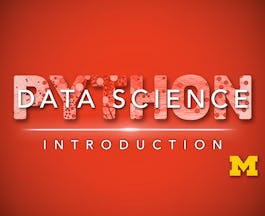
University of Michigan
Skills you'll gain: Computer Programming, Data Analysis, Data Management, Python Programming, Statistical Programming, Data Mining, Extract, Transform, Load, Computer Programming Tools, Critical Thinking, Exploratory Data Analysis, General Statistics
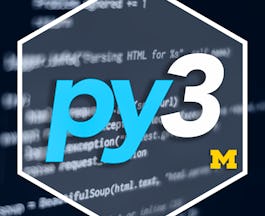
University of Michigan
Skills you'll gain: Computer Programming, Python Programming
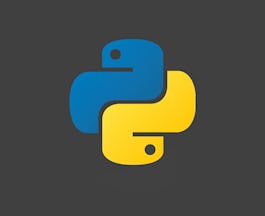
Coursera Project Network
Skills you'll gain: Computer Programming, Data Analysis, Python Programming

Skills you'll gain: Communication, Computer Programming, Data Analysis, Data Visualization, Exploratory Data Analysis, General Statistics, Machine Learning, Planning, Probability Distribution, Project Management, Python Programming, Regression, Statistical Analysis, Tableau Software

University of California San Diego
Skills you'll gain: Algorithms, Theoretical Computer Science, Computer Programming, Data Structures, Problem Solving, Mathematics, Computational Thinking, Computer Programming Tools, Computational Logic, Critical Thinking, Graph Theory, Programming Principles, Mathematical Theory & Analysis, C++ Programming, Algebra, Software Testing
 Status: Free
Status: FreeNanjing University
Skills you'll gain: Computer Programming, Python Programming, Data Analysis, Programming Principles, Data Structures, Mathematical Theory & Analysis, Statistical Programming

University of Toronto
Skills you'll gain: Algorithms, Machine Learning, Python Programming, Computer Programming, Mathematics, Theoretical Computer Science, Estimation, Mathematical Theory & Analysis, Applied Machine Learning, Computer Vision, Probability & Statistics, Software Engineering, Computer Programming Tools, Critical Thinking, Problem Solving, Strategy and Operations, Systems Design, General Statistics, Linear Algebra, Probability Distribution, Regression, Artificial Neural Networks, Planning

Skills you'll gain: Python Programming, Computer Programming, Computer Science, Operations Management, Problem Solving

Skills you'll gain: Machine Learning, Deep Learning, Machine Learning Algorithms, Artificial Neural Networks, Cloud Computing, Computer Vision, Human Learning, IBM Cloud, Natural Language Processing, Algorithms, Applied Machine Learning, Machine Learning Software, Python Programming, Computer Programming, Application Development, Cloud API, Cloud Applications, Computer Programming Tools, Human Computer Interaction, Visualization (Computer Graphics), Data Analysis, Software Engineering Tools, Cloud-Based Integration, User Experience Design, Communication, Programming Principles, Software Engineering, Customer Analysis, Software Architecture, Full-Stack Web Development, Agile Software Development, Product Management, Javascript, Data Science
In summary, here are 10 of our most popular python courses
- Google Data Analytics: Google
- Python Programming Essentials: Rice University
- Machine Learning: DeepLearning.AI
- Introduction to Data Science in Python: University of Michigan
- Python Classes and Inheritance: University of Michigan
- Python 101: Develop Your First Python Program: Coursera Project Network
- Google Advanced Data Analytics: Google
- Data Structures and Algorithms: University of California San Diego
- Data Processing Using Python: Nanjing University
- Self-Driving Cars: University of Toronto










